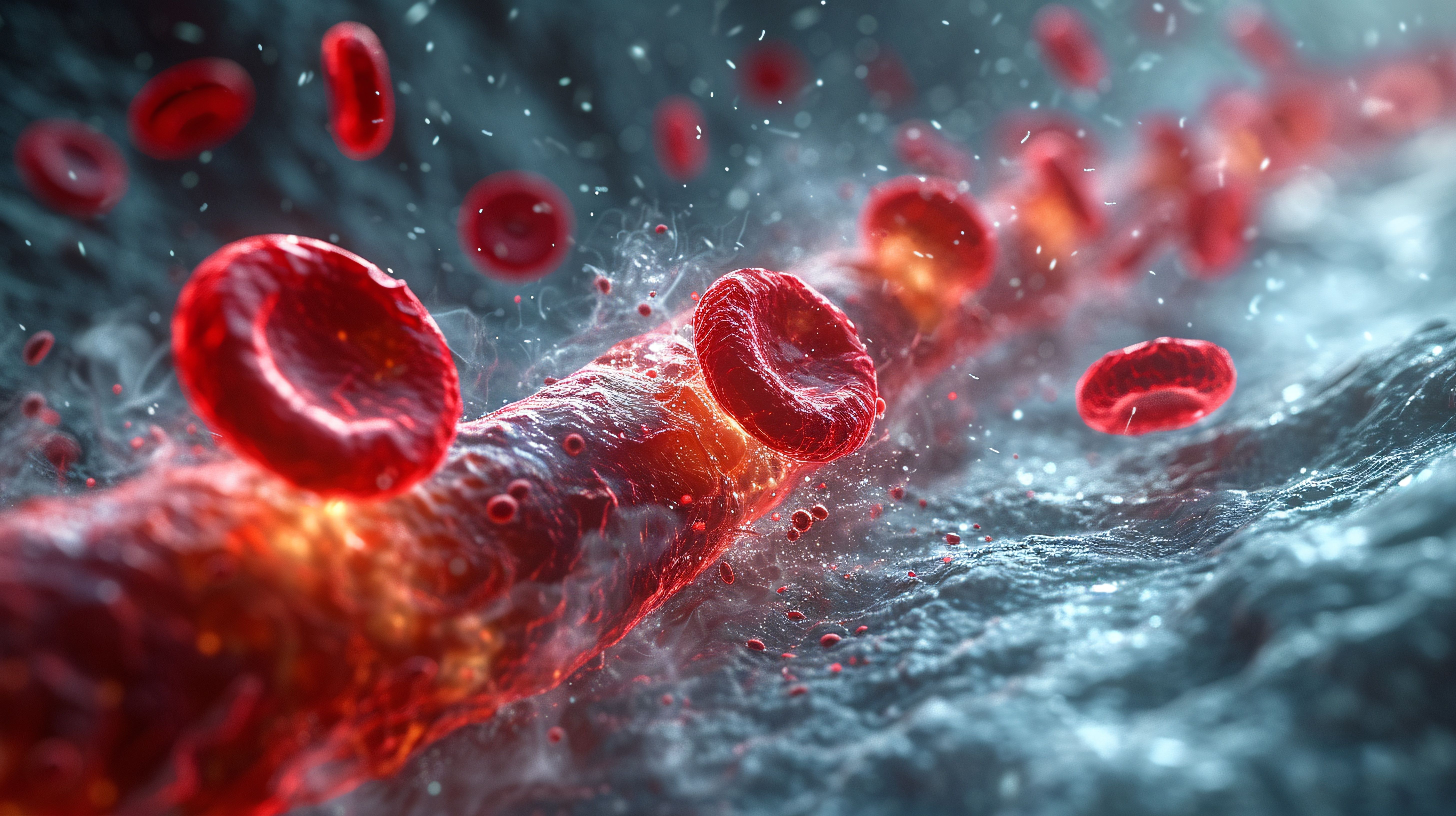- Bone Health
- Immunology
- Hematology
- Respiratory
- Dermatology
- Diabetes
- Gastroenterology
- Neurology
- Oncology
- Ophthalmology
- Rare Disease
- Rheumatology
EHA Poster Shows Transfusion Avoidance Rates Were Comparable Between Eculizumab Biosimilar, Soliris
A poster from the European Hematology Association’s (EHA) 2024 annual meeting in Madrid, Spain, showed similar rates of transfusion avoidance between patients with paroxysmal nocturnal hemoglobinuria who were administered reference eculizumab (Soliris) and those administered an eculizumab biosimilar (SB12).
A poster presented at the European Hematology Association’s (EHA) 2024 annual meeting in Madrid, Spain, demonstrated comparable rates of transfusion avoidance in patients with paroxysmal nocturnal hemoglobinuria (PNH) treated with either reference eculizumab (Soliris) or Samsung Bioepis’ eculizumab biosimilar (SB12; Epysqli).1
This analysis aimed to calculate how many patients with PNH remained transfusion free after being treated with SB12 or reference eculizumab | Image credit: Aryan - stock.adobe.com

“We are excited to present this data at EHA 2024, that adds to the growing body of evidence that supports comparable clinical efficacy of SB12 with reference eculizumab in treating PNH patients,” said HyeJin Kim, vice president and medical and lifecycle safety team leader at Samsung Bioepis, in a statement.2 “We will continue to advance with our scientific research, publication, and educational activities to bring more awareness of biosimilars for rare disease treatment and hope our study results serve as a guidance for clinicians.”
The phase 3 post-hoc study aimed to calculate the proportion of patients with PNH remaining transfusion free after being treated with SB12 or reference eculizumab and compare the safety, pharmacokinetics, pharmacodynamics, and immunogenicity between the products.
Fifty adults with PNH—characterized by 1.5 or greater upper limit of normal range of lactate dehydrogenase (LDH), a history of transfusion for anemia within the past 12 months, or PNH-related symptoms—and who were complement inhibitor naïve were randomized 1:1 to receive either SB12 (n = 47) or the originator (n = 48). Patients received 600 mg intravenously weekly for the first 4 weeks, 900 mg in the fifth week, and then 900 mg every 2 weeks. At week 26, patients switched treatments and continued until week 50. Weeks 1 through 26 were defined as period 1 and weeks 26 and beyond were defined as period 2. Treatment sequence (TS) 1 included those who transitioned from the biosimilar to the originator and TS2 included those who went from the originator to the biosimilar.
The primary end point was transfusion avoidance during the treatment period and the secondary end point was the number of units of packed red blood cells (pRBCs) transfused.
Of the randomized patients, 49 received treatment and 46 completed the study. In the 12 months prior to screening, 30 patients (60%) received at least 1 unit of pRBCs. Baseline characteristics were similar between groups.
Mean LDH was 2220.2 U/L for TS1 and 2156.0 U/L for TS2, mean hemoglobin was 89.1 g/L for TS1 and 85.9 g/L for TS2, and mean pRBC units transfused were 6.4 for TS1 and 3.8 for TS2. Post treatment, the mean pRBC units transfused were reduced to 1.1 U (TS1) and 0.9 U (TS2) in period 1, and 1.1 U (TS1) and 1.0 U (TS2) in period 2. Transfusion avoidance was 68.1% for SB12 and 72.9% for ECU, with a difference of –5.3% (95% CI, –18.9% to 8.4%; P = .4492), indicating no significant difference between treatments.
“This post-hoc analysis supports the previously demonstrated comparable clinical efficacy of SB12 with reference eculizumab in treating PNH patients, with no significant difference in reducing transfusion burden compared to reference eculizumab,” commented Kim in another statement.3 “Our dedication to make a meaningful difference to our patients remain steadfast. We will continue to work collaboratively with clinicians and physicians to further expand the treatment options for patients with orphan diseases.”
PNH is a rare genetic disease characterized by hemolytic anemia, hemoglobinuria, fatigue, and shortness of breath.4 Other symptoms include thrombosis, renal insufficiency, and potentially bone marrow failure in advanced stages. The disease, caused by mutations on an X-linked gene, significantly impacts patients' quality of life. Previously, the 10-year survival rate for PNH was only 50%, but advances in treatment, such as eculizumab, have increased survival to over 75% in the past 15 years. PNH affects up to 15.9 individuals per 1 million worldwide, although this may be an underestimate due to undiagnosed cases. It typically occurs in adults aged 30 to 40 years, but it can also affect children, albeit rarely.
Eculizumab is a long-acting monoclonal antibody that targets C5, preventing its cleavage and thus inhibiting the formation of the MAC. In patients with PNH, eculizumab significantly reduces hemolysis.5 However, PNH patients must be vaccinated against Neisseria meningitidis before treatment due to increased susceptibility to meningococcal infections and other infections, including urinary, respiratory, and gastrointestinal.
Epysqli was approved in the European Union in May 2023, following the approval of Amgen’s Bekemv (ABP 959). Bekemv was also the first and only eculizumab biosimilar approved in the US.
References
1. Jag JH, Park J, Kim Y, Ham J, Russo P. Transfusion avoidance with Epysqli™ (SB12), a biosimilar to reference eculizumab: A post-hoc analysis from the pivotal phase III study. Presented at: EHA; June 13-16, 2024; Madrid, Spain. Abstract P1916. https://s3.eu-central-1.amazonaws.com/m-anage.com.storage.eha/temp/eha24_abstract_bodies/P1916.pdf
2. Samsung Bioepis to present post-hoc analysis of phase 3 study for Epysqli™ (SB12; eculizumab biosimilar), at the European Hematology Association (EHA) Congress 2024. News release. Samsung Bioepis; May 30, 2024. Accessed June 13, 2024. https://finance.yahoo.com/news/samsung-bioepis-present-post-hoc-063000146.html
3. Samsung Bioepis presents post-hoc analysis of phase 3 study for Epysqli™ (SB12; eculizumab biosimilar), at the European Hematology Association (EHA) Congress 2024. News release. Samsung Bioepis. June 14, 2023. Accessed June 14, 2024. https://finance.yahoo.com/news/samsung-bioepis-presents-post-hoc-070000730.html
4. Shah N, Bhatt H. Paroxysmal nocturnal hemoglobinuria. StatPearls. Updated July 31, 2023. Accessed June 13, 2024. https://www.ncbi.nlm.nih.gov/books/NBK562292/#:~:text=Introduction-,Paroxysmal%20nocturnal%20hemoglobinuria%20(PNH)%20is%20a%20rare%20disease%20that%20presents,fatigue%20and%20shortness%20of%20breath
5. Dubois EA, Cohen AF. Eculizumab. Br J Clin. Pharmacol. 2009;68(3):318-319. doi:10.1111/j.1365-2125.2009.03491.x
Newsletter
Where clinical, regulatory, and economic perspectives converge—sign up for Center for Biosimilars® emails to get expert insights on emerging treatment paradigms, biosimilar policy, and real-world outcomes that shape patient care.
